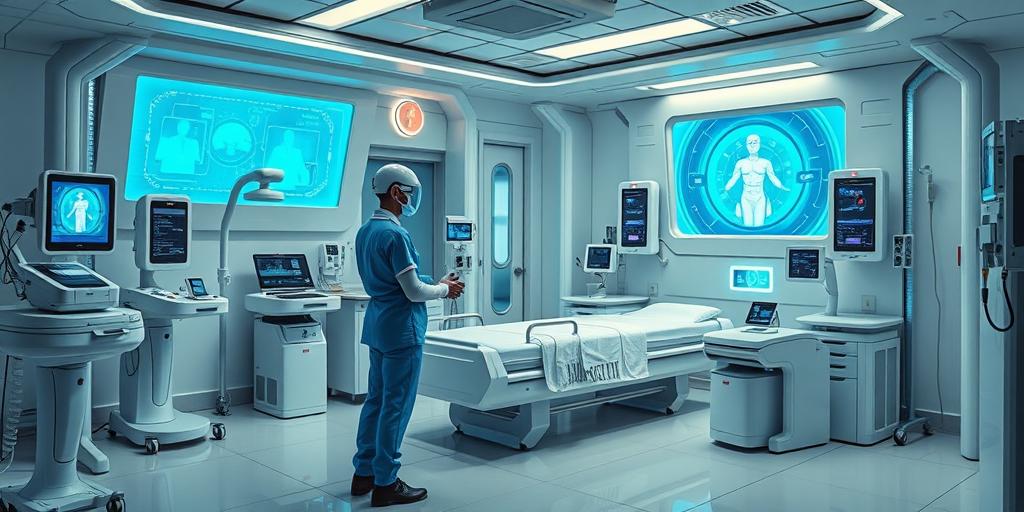The healthcare industry is on the cusp of a revolution, driven by the transformative power of AI Healthcare. This technology is rapidly changing the way we diagnose, treat, and manage diseases, offering unprecedented opportunities to improve patient outcomes and revolutionize healthcare delivery. From identifying potential health risks early on to personalizing treatment plans, AI is poised to play a pivotal role in shaping the future of healthcare.
The Future of AI in Healthcare: A Glimpse into Tomorrow
Introduction: The Transformative Power of AI in Healthcare
AI Healthcare is poised to disrupt traditional healthcare practices, bringing about a new era of precision and efficiency. By leveraging the vast amounts of data generated by healthcare systems, AI algorithms can analyze patterns, identify trends, and predict outcomes with remarkable accuracy. This has profound implications for various aspects of healthcare, from diagnosis and treatment to drug discovery and patient management.
AI-Powered Diagnosis and Treatment
Revolutionizing Disease Detection
AI algorithms are being trained on massive datasets of medical images, enabling them to detect subtle abnormalities that may be missed by human eyes. This is particularly crucial in areas like cancer screening, where early detection can significantly improve survival rates. For example, AI-powered tools can analyze mammograms to identify breast cancer at an earlier stage, potentially leading to more effective treatment options.
Personalized Treatment Plans
AI is also revolutionizing the way we approach treatment. By analyzing a patient’s medical history, genetic information, and lifestyle factors, AI algorithms can generate personalized treatment plans tailored to their unique needs. This allows for more effective and targeted therapies, leading to better outcomes and reducing the risk of adverse reactions.
AI in Drug Discovery and Development
Accelerating the Drug Development Process
AI is transforming the pharmaceutical industry by accelerating the drug development process. By analyzing vast amounts of scientific literature and experimental data, AI algorithms can identify potential drug candidates and predict their efficacy and safety. This can significantly reduce the time and cost associated with traditional drug discovery, bringing new therapies to market faster.
Identifying New Drug Targets
AI is also helping to identify new drug targets, opening up new avenues for treatment. By analyzing the complex interactions within the human body, AI algorithms can identify previously unknown targets that could be exploited to develop new therapies. This is particularly relevant in areas like cancer research, where finding new targets is crucial for developing effective treatments.
AI-Enabled Healthcare Management
Optimizing Hospital Operations
AI can help optimize hospital operations by automating tasks, improving resource allocation, and reducing wait times. For example, AI-powered chatbots can handle basic patient inquiries, freeing up healthcare professionals to focus on more complex tasks. AI algorithms can also analyze patient data to predict hospital readmissions, allowing healthcare providers to intervene early and prevent avoidable readmissions.
Improving Patient Engagement
AI can enhance patient engagement by providing personalized health information and reminders. AI-powered apps can track patient health data, provide medication reminders, and offer personalized health recommendations. This can help patients take a more proactive role in managing their health and improve adherence to treatment plans.
Ethical Considerations and Challenges
Data Privacy and Security
The use of AI in healthcare raises important ethical considerations, particularly regarding data privacy and security. AI algorithms rely on vast amounts of sensitive patient data, and it’s crucial to ensure that this data is protected from unauthorized access and misuse. Implementing robust data security measures and adhering to privacy regulations is essential for building trust in AI-powered healthcare solutions.
Bias and Fairness in AI Algorithms
Another ethical concern is the potential for bias in AI algorithms. If training datasets are not representative of the population, AI algorithms may perpetuate existing biases, leading to unfair or discriminatory outcomes. It’s crucial to address this issue by ensuring that training datasets are diverse and representative, and by developing mechanisms to detect and mitigate bias in AI algorithms.
The Role of Human Expertise
While AI has the potential to revolutionize healthcare, it’s important to remember that AI is a tool, not a replacement for human expertise. Healthcare professionals will continue to play a vital role in interpreting AI-generated insights, making clinical decisions, and providing compassionate care.
Conclusion: A Future of Enhanced Healthcare with AI
The future of healthcare is bright with AI. This powerful technology has the potential to improve patient outcomes, reduce healthcare costs, and accelerate the pace of medical innovation. By embracing AI, healthcare providers can unlock new possibilities for diagnosing and treating diseases, developing new therapies, and improving patient care. However, it’s essential to approach AI development and implementation responsibly, addressing ethical concerns and ensuring that AI serves to enhance, not replace, human expertise. As we move forward, it’s crucial to foster collaboration between AI researchers, healthcare professionals, and policymakers to create a future where AI empowers healthcare providers and improves the lives of patients.




